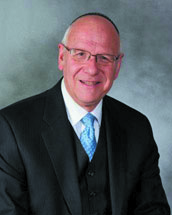 This week’s haftarah, the second of the “t’lat d’pur’anuta,” three haftarot of punishment that precede Tish’a B’av, is taken from the second and third chapters of Yirmiyahu and is a direct continuation of the selection that we read last week. This, the first prophecy that the navi addresses to Israel, accuses the people of being disloyal to God. By turning to the false gods of other nations, Israel abandoned their faith in the one God and, by doing so, were even worse than the nations who remained faithful to their gods. That faithlessness, Yirmiyahu argues, is what led the people to be ungrateful, for when one doesn’t believe that Hashem is the One, the only, the all-powerful, he will not see Him as the source of all blessing and all good and, therefore, deserving of our thanks.
This week’s haftarah, the second of the “t’lat d’pur’anuta,” three haftarot of punishment that precede Tish’a B’av, is taken from the second and third chapters of Yirmiyahu and is a direct continuation of the selection that we read last week. This, the first prophecy that the navi addresses to Israel, accuses the people of being disloyal to God. By turning to the false gods of other nations, Israel abandoned their faith in the one God and, by doing so, were even worse than the nations who remained faithful to their gods. That faithlessness, Yirmiyahu argues, is what led the people to be ungrateful, for when one doesn’t believe that Hashem is the One, the only, the all-powerful, he will not see Him as the source of all blessing and all good and, therefore, deserving of our thanks.
Sadly, Israel was led onto this wayward path as a result of the blessings God had showered upon them. Their success led them to believe that they are a privileged nation, protected by God, whose Temple stood in their midst, and, as they mistakenly believed, who would never allow His Temple to be destroyed! Even while under the Babylonian siege the Jerusalemites chose to heed the words of the false prophets rather than look into their own actions and repair their ways. This is why the prophet cries out to them: “How can you claim: ‘We have not sinned?’ Look at your path in the valley (perhaps referring to Gei Ben Hinnom, where they practiced Molech worship of child sacrifice) and see what you have done!!” Tragically, Yirmiyahu’s words remain unheeded, for Israel fails to realize that she is only “privileged” when she accepts her divine responsibilities and “chosen” only to carry out God’s mission for her.
With the approach of Tish’a B’av, the haftara reminds us to repair that sin by taking a fresh look at our lives and recognizing God’s presence and His kindness that surround us. By doing so, we would be more aware of the many blessings we have received and better appreciate God’s beneficence so that we could properly thank Him for it. Only in that way can we fulfill God’s wish that He expresses at the end of the haftara: “Oh, if you would but once again call me ‘My Father, Master of my youth.’”
Rabbi Neil Winkler is a past rabbi of the Young Israel of Fort Lee and now lives in Israel.










